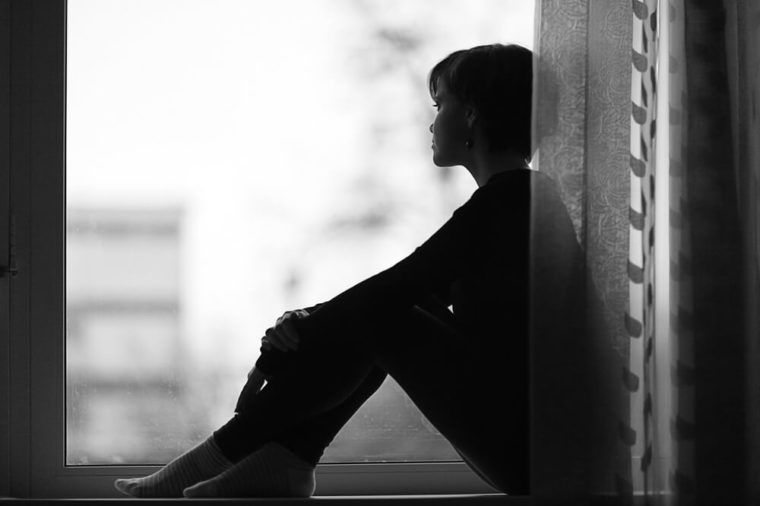Anxiety is common

Anxiety is one of the most prevalent mental illnesses in the United States, affecting approximately 40 million American adults (18 percent of the population). If that’s not jarring enough, it’s still a highly under-recognized condition—although so many suffer, most people suffer in silence. Social anxiety disorder (SAD), otherwise known as social phobia, is one common type of anxiety disorder that involves a significant amount of fear in one or more social situations. “These fears can be triggered by real or perceived criticism by others and can impact a person at school, work, a social gathering, crowded place like restaurants, bars or sporting event, and even places like doctor’s offices or stores,” explains Jesse Matthews, PsyD, Pennsylvania-based psychologist.
(If you’re surprised to find that SAD is so common, check out some more common myths about mental health.)
SAD affects people of all ages
Social anxiety disorder doesn’t discriminate by age, gender, race, culture or any other variable. “The research shows that SAD tends to be more prevalent, however, in those who value others’ opinions about them, particularly as they relate to opportunities for friendship, relationships or employment,” says Dr. Matthews. Though most people have experienced some degree of being hyper-aroused in social situations, only about 7 percent of adults are currently suffering from social anxiety disorder specifically, and only about 2 percent severely, according to the Anxiety and Depression Association of America. Here are some small, but effective strategies for dealing with social anxiety.
SAD comes with physical symptoms
Symptoms of SAD can be as harmless as feeling hot and sweaty, breathing heavy, experiencing headaches or even nausea, but it can also come with more serious side effects such as panic attacks, tremors, heart palpitations, lightheadedness, and an upset stomach. “Individuals may also have negative thoughts about themselves, difficulty focusing on a task (such as a speech or presentation) or feeling as though everyone is watching or judging them,” says Dr. Matthews.
SAD may stem from childhood experiences
While anyone can develop SAD, research has found a connection to childhood trauma. Specifically, Pilar Jennings, PhD, psychoanalyst and author of To Heal a Wounded Heart, says that it tends to be common in individuals who were raised in a family with high or rigid expectations. “Families prone to shame and blame also tend to induce pervasive anxiety—the sense of walking a tightrope can develop and become part of people’s inner template for a relationship,” she adds. “When we’re young, we develop beliefs about who we are and how relationships work before we can consciously reflect on these beliefs, but for people raised in families that create anxiety, these beliefs can feel like absolute truths,” she explains.
People with SAD may avoid social interaction
It’s an understandable way to cope, but isolation can deprive SAD sufferers of the opportunity to enjoy situations that can end up giving them confidence, says Dr. Jennings. While it’s not easy, she says, if you’re suffering from this anxiety, being social can be healing. “Be patient with yourself—it can take time to trust that judgment and criticism are not the only acceptable outcome.”
Content continues below ad
People closest to sufferers can get hurt
SAD can be hard on friends, family members, co-workers, and significant others—for example, when a SAD sufferer snaps at a friend encouraging him or her to be more social. “Social anxiety is about the person suffering from it—it stems from their own feelings and symptoms about interacting socially in general,” says Paulette Sherman, PsyD, psychologist, director of the site My Dating & Relationship School, and author of Dating from the Inside Out. “The likelihood is that a SAD sufferer is disappointed for disappointing a friend, and that they care about that friend very much.” Here are tips on solving everyday friendship problems.
SAD is not synonymous with “anti-social”
“It is untrue that most people with social anxiety prefer to be antisocial and to avoid connecting with others,” says Dr. Sherman. “In fact, many of them feel very lonely and want nothing more than to connect and feel a sense of support, acceptance, community, and belonging.” Their wish is often to be able to go out and have fun, but it’s often their fears of judgment and anxiety that stop them from acting on this desire, Dr. Sherman explains. “It is something they need to learn how to combat through treatment and possibly with the help of medication over time.”
SAD can be unpredictable
“There are cases where someone with social anxiety feels fine, and then suddenly something is triggered and they start to have a panic attack or other symptoms and want to leave an event,” says Dr. Sherman. “Although this may be difficult to understand for the person with them, it is not an attempt at manipulation or something they can control.”
Do you know the symptoms of a panic attack?
SAD doesn’t just cause distress in the heat of the moment
Many people who suffer from SAD experience anticipatory anxiety—they worry about an episode occurring. “An individual may begin to experience symptoms moments, hours, days, or even weeks before a known event,” says Dr. Matthews. This is particularly common in situations involving public speaking. “A person may fear that he will look bad while speaking, stutter or fumble over words, sound like he doesn’t know what he is talking about or face questions he isn’t prepared to answer,” says Dr. Matthews. “Given the height of the anxiety, any of this may actually occur!”
It’s hard for SAD sufferers to meet new people
“The fact that they have no basis of trust or experience with that person can make the stakes feel higher because there are more unknowns,” says Dr. Sherman. “They may need more support and compassion in these situations should they attempt to work through them.”
Take advantage of these eight tips on the best ways to meet—and attract—people.
People with SAD are often hypercritical of themselves

According to Dr. Matthews, SAD sufferers can set unrealistically high expectations on their appearance, behavior, or performance, and become obsessed with minor details. “If they perceive anything as even slightly wrong, they may blow it out of proportion,” he says. “For example, if a person has a pimple or spills a small amount of coffee on himself, he may be overly conscious of his appearance, or if he trips on the carpet or drops his papers prior to a presentation, his anxiety may go sky high, thus impacting performance.”
Content continues below ad
SAD steals opportunity
Dr. Matthews explains that fear of judgment or rejection interferes with meeting new friends or going on dates—and the fear can also cause them to drift apart from existing friends. “Individuals may even limit themselves in terms of school or career, opting for online college or commuting locally instead of going away to college or taking a lower-paying job or declining a promotion in order to avoid having to deal with people,” he says.
You can’t talk someone out of social anxiety
If you’re not suffering from SAD yourself, it can be difficult to understand what it’s like and why someone can’t seem to “shake it off.” But logic doesn’t play a role in this condition: “If someone has SAD, their social anxiety consists of physical symptoms, fears, negative thoughts and a constellation of things that can often require cognitive therapy and medication,” says Dr. Sherman. “Although you would love to help, it’s unrealistic to think you can cheerlead or talk someone out of this and it puts undue pressure and unrealistic expectations on that person.”
Social anxiety usually comes with a lot of embarrassment and shame
Those suffering from this disorder often feel they’re being judged harshly by others—and that can lead them to be difficult to deal with. Knowing the source of this behavior, however, can help you help them alleviate the shame, notes. Dr. Jennings. “It has a cause, sometimes multiple causes, and more awareness of these causes can usher in needed compassion alongside increased trust in healing,” he says.
Many sufferers self-medicate with alcohol or other drugs
There’s a reason alcohol goes by the name “liquid courage.” Drinking and drugs lower people’s inhibitions, often reducing anxiety and making people less self-conscious. Relying on it as a means of opening up and relaxing in social situations can be dangerous, especially if you’re taking other medications for anxiety. “Anti-anxiety medications may also be used for the purpose of allowing people to relax in social situations, though regular use isn’t typically indicated, due to their often addictive nature,” says Dr. Matthews. “It can also be very dangerous, even fatal, for individuals to mix alcohol with other substances, including anti-anxiety medications.” Try these natural remedies for anxiety disorders instead.
SAD is treatable
Fortunately, there is a lot people can do to help themselves manage symptoms of social anxiety. “There is a lot of support available these days in the form of self-help books, online communities and support, therapy and skills training, and medication,” says Marni Amsellem, PhD, consultant and private psychology practice, Smart Health Psychology. “All have their benefits, and there is no one-size-fits-all approach.” One of the more popular methods of treatment for SAD is cognitive behavior therapy (CBT), which involves helping an individual understand the connection between their thoughts, feelings, and behavior while helping them to learn skills for altering their anxious thoughts, thus reducing anxious feelings and behavior, explains Dr. Matthews. “Medication may also be prescribed by a physician to help a person to manage symptoms of SAD, though a person must be careful to follow the physician’s orders, keeping in mind that these kinds of medications may be abused or a person could develop a dependency on them,” he adds. Medication, of course, can help to manage symptoms, but does not teach a person about their anxiety or how to cope with it the way CBT can.
The post 15 Things About Social Anxiety Disorder Psychologists Wish You Knew appeared first on Reader's Digest.
from Reader's Digest http://ift.tt/2DVPpif
No comments :
Post a Comment